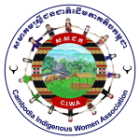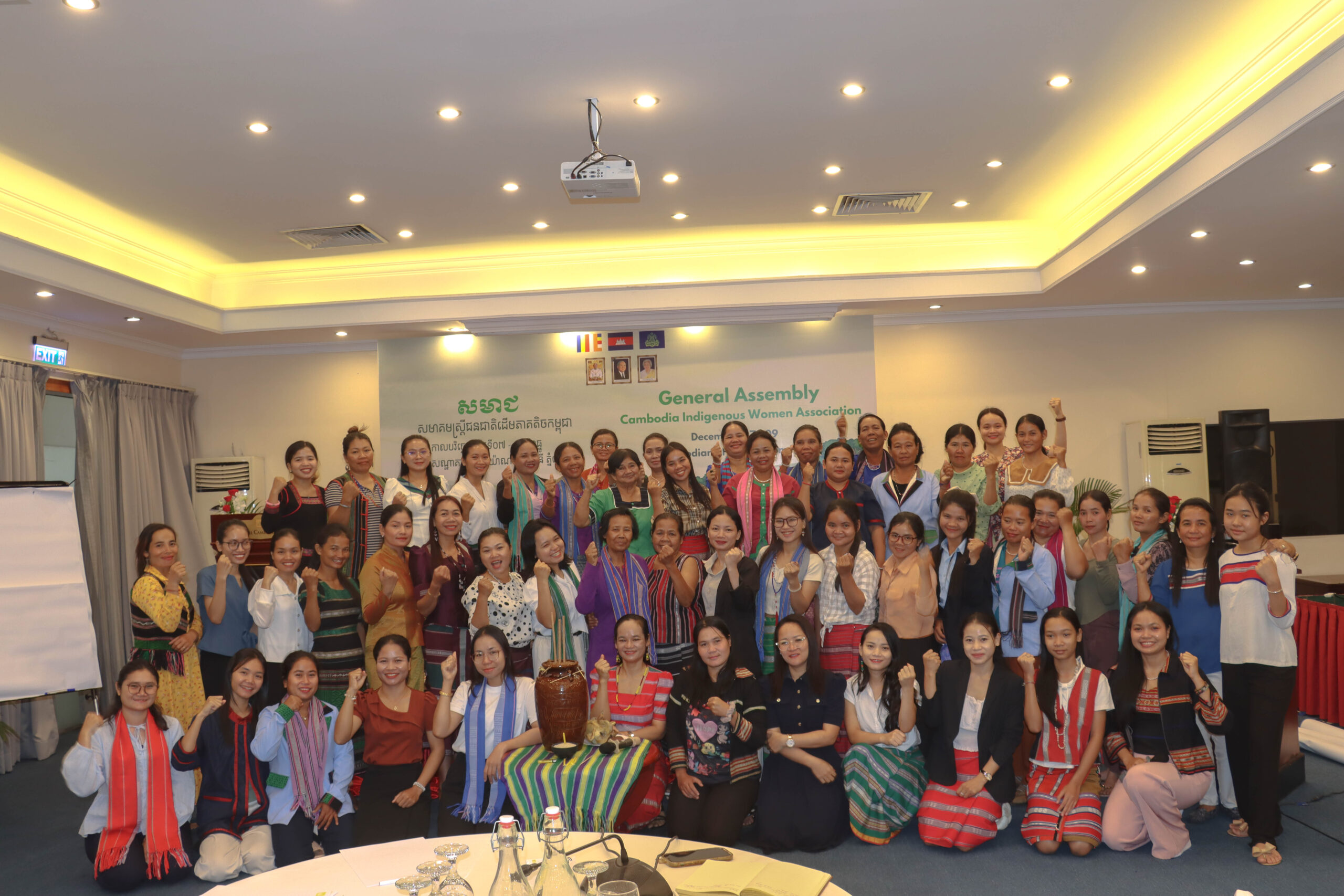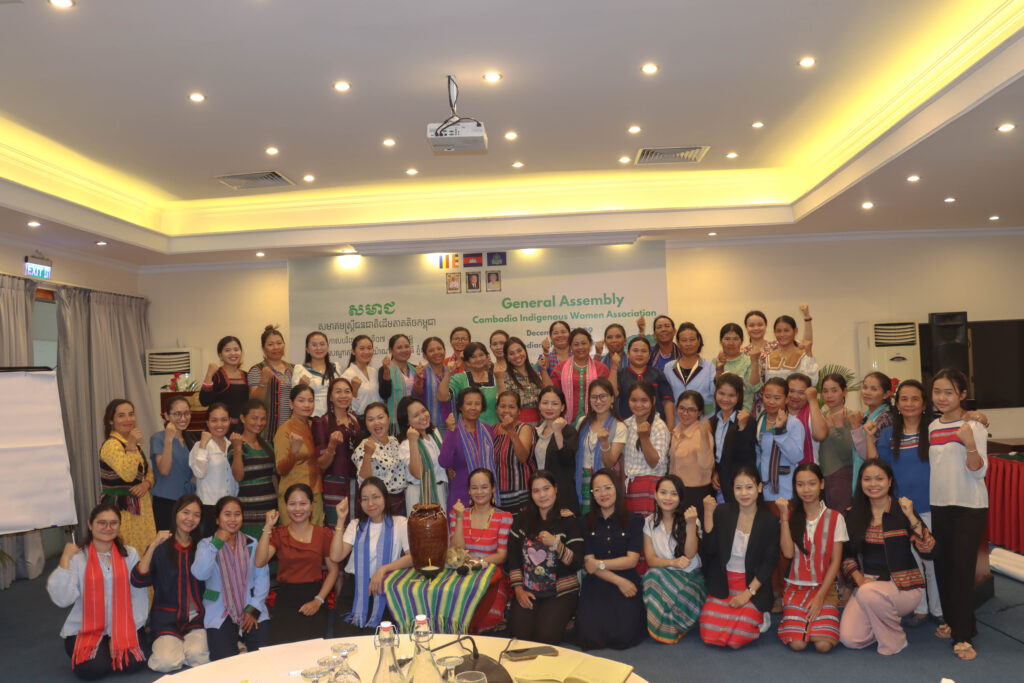
The Cambodia Indigenous Women Association (CIWA) aimed to improve the lives of Cambodia’s indigenous women. CIWA was founded to address the particular challenges these women experience, and it has since become an example of empowerment, promoting community development, cultural preservation, and rights advocacy for Indigenous women in rural areas.
This significant storytelling shows how CIWA has impacted the lives of Indigenous women, created to improve social fairness and enhance economic opportunities. For many past centuries, Indigenous women actively protected and promoted cultural identity, traditions, and language for future generations but often faced heavy responsibilities in family, community, and education, ignored by male counterparts and society.
Therefore, CIWA became the first association led by Indigenous women in Cambodia, officially founded on September 2, 2018, by 37 Indigenous women representing diverse communities from seven provinces and Phnom Penh.
By October 2020, the group expanded to include 66 Indigenous women, who unanimously agreed to establish the Cambodian Indigenous Women Association (CIWA). Focused on uplifting and promoting women’s rights, CIWA formally registered with the Ministry of Interior and was recognized as a legal entity on May 9, 2022.
Today, CIWA has 105 members, 5 boards, and 14 secretariat staff. Mrs. Choeun Sreymom originally from Bunong Indigenous has been the president of CIWA from 2019 to the present. Under her leadership, she continues representing Indigenous women from various provinces to promote and strengthen women’s leadership, and empowerment of women across provinces in Cambodia.
The association addresses the common issues faced by Indigenous women, including climate change, land rights violations, deforestation, cultural preservation, gender-based violence, discrimination, health and education access, and the lack of recognition of women’s roles in society. It also advocates for justice in cases of human rights defenders’ deaths and other challenges specific to Indigenous communities.
“ The issues of women are the issues of us all. CIWA’s support extends not only to me but also to other Indigenous people by providing lawyers and financial assistance in land and human rights disputes, ensuring justice and equality for victims.
The association has a clear vision for Indigenous women and girls to have ownership and self-determination on land and natural resource management effectively with strong economic and being able to conserve and protect their rights to land, culture, tradition, and identity sustainably, living with dignity within the society of Cambodia.
CIWA stands as a voice for the women who form the backbone of Cambodia’s Indigenous communities. This association plays an important role in promoting enforcement, well-being for the public, rights to access to culture, land/natural resources, and strengthening women’s initiative for development. In this article, you will explore several associations’ achievements based on practical.
Firstly, CIWA promotes cultural preservation, with Indigenous women playing an important role in preserving their communities’ traditional identity. Through programs and events, they share knowledge and abilities, empowering women to be proud of their cultural heritage.
This cultural renaissance promotes social connections and fosters pride and identity in Indigenous women, ensuring that their traditions survive and prosper. For example, the association supports young women in leading the campaign as well as Indigenous Peoples Day, Women’s Day, and Indigenous Cultural Days, which allow women to show their cultures and community interactions.
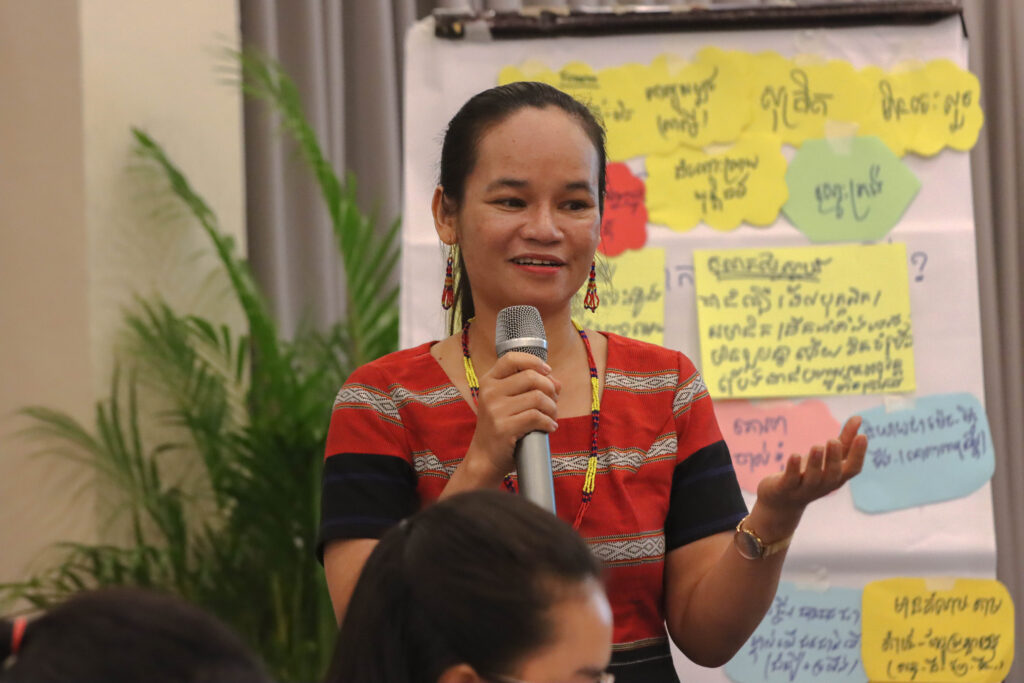
“My work with the Cambodia Indigenous Women Association stems from a deep respect and commitment to uniting women through a collective voice and empowering them to form self-help groups. Over the past six years, I have focused on building resources for young Indigenous women and promoting their identity, culture, and traditions. This includes creating opportunities for them to showcase their language, attire, arts, and knowledge through events such as the International Day of the World’s Indigenous Peoples, forums, workshops, and study tours, both locally and internationally.” Lat Sok Em, Kreung Indigenous, Founder and Head of CIWA Members’ Fund.
Secondly, we promote women’s economic as well as livelihood and initiatives for Indigenous women benefiting from cooperative farming, handicraft production, and ecotourism, which provide them with income and support. These initiatives enable them to sell their products, share skills, and invest in their children’s education and healthcare.
Financial stability also empowers women to participate in community decision-making processes. In the good case, the program supports the building of the Indigenous Market in Senmorom Town, located in Mondulkiri province. It highlights the commitment of associations to promote women in economic development. In this market, Indigenous women can sell their products to the markets to increase their incomes.
The program promotes Indigenous women’s rights in participation and understanding of national and international frameworks, leadership, project management, and proposal writing, with 168 women and 20 men attending the workshop (2020). The association supports women to join public campaigns likewise podcasts, and live shows to raise their concerns and rights on land and natural resources.
“I gained knowledge about leadership, management, and gain knowledge about rights and laws,” Romam Sreypov, member of the CIWA expressed during the congress on 10 December 2024.
Third, CIWA strengthened capacity-building efforts by conducting 12 training sessions for 149 participants, focusing on report writing, digital security, and legal frameworks. The organization supported Kui Indigenous women in Kampong Thom with start-up packages to boost entrepreneurship and produced impactful media, including videos on Indigenous rights, identity, and Understand ILO Convention No. 169.
They are also able to use media as a tool to advocate for rights. Through this support, Indigenous women have the confidence to express their challenges in addressing their community issues. As an example, two women are brave and able to raise their voices after attending regional and international events, and now they become our staff.
“I am brave enough to speak up and confident to show who I am to everyone, because in the past, I had no confidence to raise it,” Thip Yav, CIWA’s women member, said during the congress in Phnom Penh.
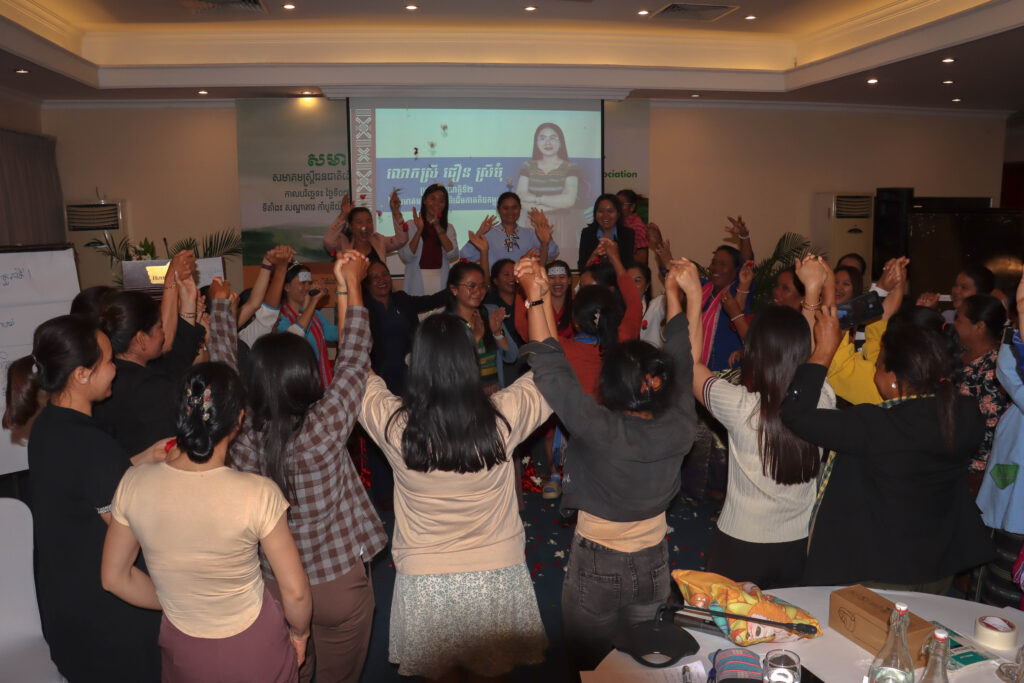
Our association works tirelessly to ensure Indigenous women’s voices are heard in policy discussions, advocating for their rights to land, resources, and social services.
In addition, CIWA is the source of information about Indigenous women in Cambodia because they work closely with Indigenous women on the ground. CIWA published and documented more than 300 books of reports on gender-based violence against Indigenous women in three provinces and published the report estimating 200 books titled Voice of Indigenous Women, Livelihoods, and Adaptation to Climate Change.
“ Seeing the growth of our members and their ability to help vulnerable girls receive an education truly is a testament to the power of collective effort.” said Len Suphanika, Provincial representative of CIWA.
They also emphasized documenting the best practices and leadership of Indigenous women in Preah Vihear, Stung Treng, Mundolkiri, and Ratanakiri. Moreover, document the video documentary on rural women and Indigenous women, and publish more documents related to Indigenous women’s issues to address the challenges. CIWA succeeded in producing a case study for 10 cases on the best practices and challenges of Indigenous women in land management and the use of natural resources in Cambodia.
Furthermore, we have produced more than five song titles: Ips Day, Lose Love, Ips Day Miss You, Hope, One Cambodian Nation, and Diamond. These songs are very inspiring to women to keep moving forward to achieve their dreams. At the same time, our association produces documentary relevance to Indigenous women in cultural preservation and promotes women’s rights. Through the documents, CIWA also struggles to show the hidden traditional role and best practice of Indigenous women in preserving the Indigenous identity seeds in rotational farming.
Fourth, provide counseling and support to women victims who violated to get full scholarships, accommodation, mental healing, and support on their education. Meanwhile, the association provided many training sessions on entrepreneurship and business plans for 39 women, but 33 women proposed 1 common plan and drafted 2 plans.
CIWA not only consistently offers benefits to its members during times of hardship but also supports counseling and supporting women’s initiatives. The association succeeded in supporting one woman member who was violated of her rights related to land and natural resources; now she won the case in the Supreme Court on 25 December 2024.
More importantly, CIWA is the first Indigenous women’s association that supports women in engagement at the analysis level as well as supports women in providing inputs to the Environmental Code, Draft Land Law, and Protected Area Law related to Indigenous Peoples.
Apart from this, we also support our representatives to attend the international forum level, likewise EMRIP in Switzerland (2024). CIWA supported one of its members in receiving the LEADERSHIP AWARD at the award ceremony for leadership recognition by the International Indigenous Women’s Forum (FIMI) in Tanzania, in August 2024, for her outstanding leadership in her community in Cambodia. We supported one young women member to attend one week of the regional training related to Indigenous Women in Asia in the Philippines in September 2024.
“From the CEDAW and UNDRIP workshop, I learned that these international frameworks are vital for empowering Indigenous women. They provide strong support for advocating the rights of Indigenous women and girls, especially in securing basic rights. These tools help amplify their voices globally, strengthen their leadership, and address challenges like violence, discrimination, and limited access to services while promoting justice, cultural preservation, and equality. ” Rochom Munny, CIWA’s intern, attended the workshop in the Philippines in September 2024.
This association plays an important role in empowering Indigenous women and women in Cambodia. It is one of the platforms where women, specifically Indigenous women, are available to promote women’s voices to be heard and take intervention for Indigenous women who are facing challenges.
In conclusion, the story of change brought about by the Cambodia Indigenous Women Association is a powerful testament to the resilience and strength of Indigenous women. Through education, cultural preservation, economic empowerment, and advocacy, CIWA has transformed the lives of many women, enabling them to enhance their identities and assert their rights, and improving women’s livelihood. CIWA is home to women who get the opportunity to engage in promoting gender equality, representation, and safeguarding Indigenous women’s rights in Cambodia.
